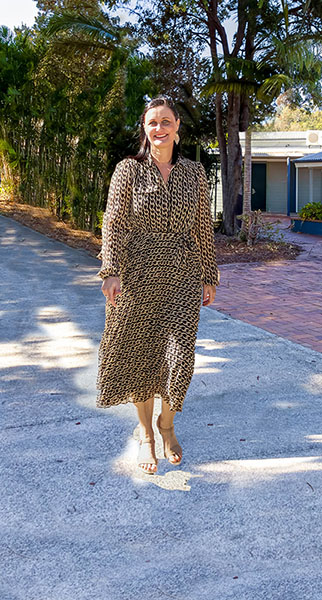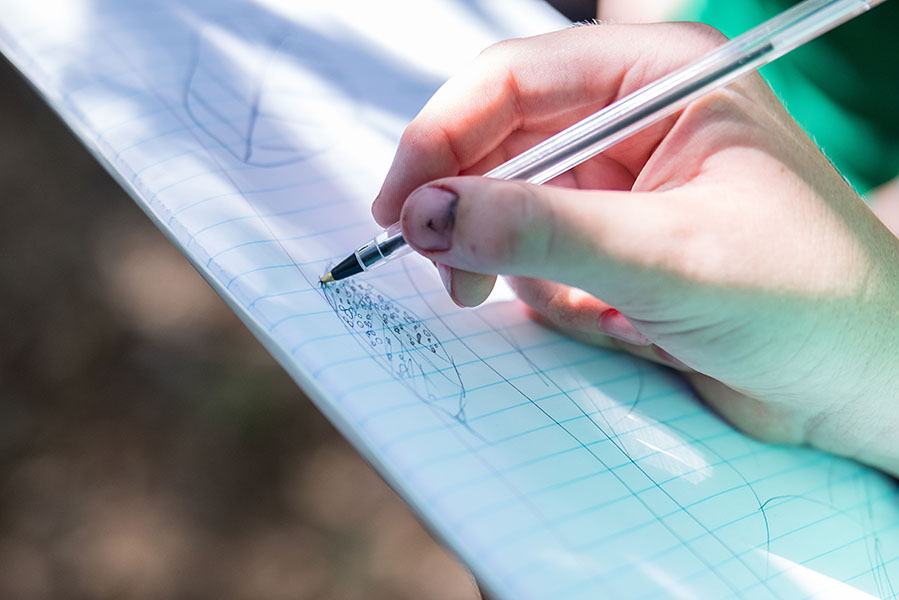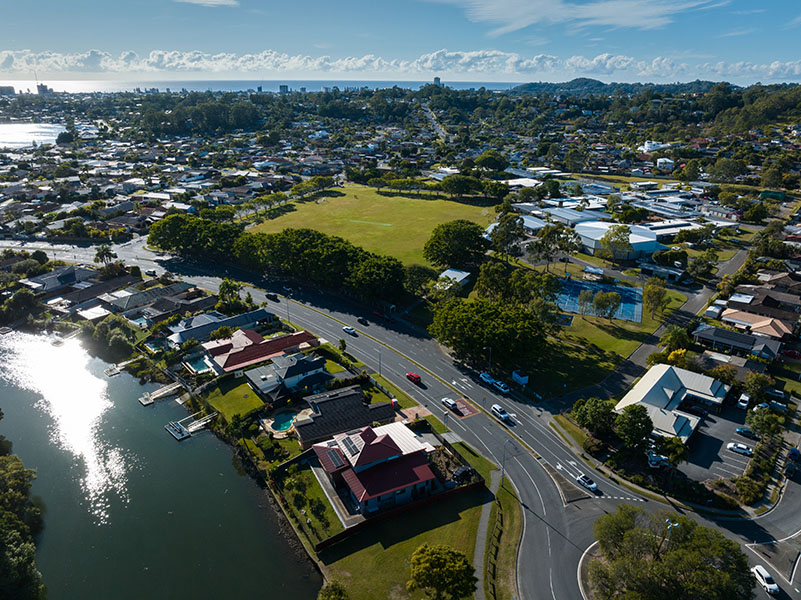 Lining Rochelle Lewis's office walls are snapshots of beaming students, moments of triumph and the perfect barrel wave. If these walls could talk, they'd tell a story of a successful career devoted to education and a vibrant coastal community.
Lining Rochelle Lewis's office walls are snapshots of beaming students, moments of triumph and the perfect barrel wave. If these walls could talk, they'd tell a story of a successful career devoted to education and a vibrant coastal community.
From the outside, being a principal looks like a role she was born to do. But as a student, Rochelle found school irrelevant.
Today, she's made it her mission to ensure no other student feels that way.
For Rochelle, as a student, school was something 'you simply must do'. There wasn't a notion of making it interesting for kids. In her mind, the learning was boring and pointless.
But during PE class, that feeling melted away. The outside breeze provided clarity on the court, as she captained and strategised as part of a team.
'Sport’s always been a big part of my life, so I suppose the one thing I found relevant at school was the experience around sport and the lessons that was teaching me,' she says.
When Rochelle's parents encouraged her to choose a path, she thought it could be fun to teach kids sport.
She didn’t know it yet, but her journey to becoming Principal began when she started her career as a Health and Physical Education teacher.
As principal, Rochelle’s work is guided by her simple yet impactful mantra: 'Only when students’ wellbeing is taken care of, can they truly learn'.
You'll find this mantra echoes in everything they do at
Elanora State High School.
It's also the backbone of a suite of initiatives that are transforming the school community.
A reverse approach to behaviour
Under Rochelle's leadership, the school has reduced student suspensions by 63% since 2022.
With around 1,000 students enrolled, that's a significant impact—but the numbers only tell part of the story. To reduce suspensions, Rochelle called on the school's Head of Engagement and Wellbeing Michelle Hewison to design a behaviour 're-teach' program.
Michelle—an experienced education leader and regional coach mentor—already had the ideas in her mind. 'Rochelle said to me, take a day and go home and just write and get it out of your head. And that's pretty much how it happened,' she says.
The re-teach program is tailored for students who face challenges in meeting social or behaviour expectations, or have difficulty engaging with their learning.
In the program, students are temporarily withdrawn from their regular classes and focus on addressing behaviours that hinder their learning.
Rochelle says as a result of the re-teach program, they've seen a reduction in behaviour incidents in the classroom and students are re-engaging with their learning.
'Students are taught their regular class content one-on-one, so we can help them with their learning and experience success,' she says.
'But then on top of that, they're taught explicit lessons on topics such as executive functioning of the brain, self-regulation, consequential processes and sensible decision making'.
Michelle says they need to teach behaviour the same way they teach the curriculum, so students access the modules independently using QLearn.
'The re-teach program is effective because it's based around an applied knowledge of functional behaviour and that student behaviour is communication,' she says.
'We actually bring an awareness to what the behaviour is, where it's come from and how it's begun and how we can work towards reteaching a replacement behaviour'.
Michelle, and the dean for the student's year level, then support the student and teacher as they trial replacement behaviours in the classroom.
Michelle says since last year she and the deans have accelerated their ability to provide intensive support and intervention to students.
'We aren’t in the classroom with our own classes per se. We're in all classes and we're on the ground all the time, on call,' she says.
'Teachers can call us directly if they've tried everything in their toolkit, and it's still not working.
'We can remove the student, de-escalate, talk to the families, get perspectives and then we go from there'.
Michelle says students trust them because they provide a safe place to give their version of events and understand that 'it's just [the] behaviour, it’s not you [as a person]'.
'Even though we can be punitive, they see that other side of us which is about that proactive, preventative approach: "We're here, we've got your back. But we'll hold you accountable if you do the wrong thing too",' she says.
'Another reason re-teach works is because we're building capability in our teachers to help manage any ongoing minor behaviours in the classroom'.
Michelle says while they have seen a significant reduction in suspensions, she wants to be clear the school does still suspend where it's needed.
Michelle attributes being a
Positive Behaviour for Learning school as the backbone of the success they’re having with improving student behaviour.
Under this Department of Education framework, school staff follow a proactive, preventative approach to behaviour, ensuring all students receive the right support to help them thrive at school.
That's what the re-teach program is all about.
 Youth vaping plummets
Youth vaping plummets
The school's re-teach approach has also been used to tackle the wider issue of youth vaping with effective results.
Rochelle says less than 5 students recorded vaping incidents last year with the school's Vaping Intervention Program in place.
The program addresses the dangers of vaping and vaping addiction and is offered in partnership with Youth Drugs and Alcohol Advice.
Students can participate in the 2-week program during lunch breaks instead of a suspension. Head of Engagement and Wellbeing Michelle Hewison says since having the program they haven’t had re-offenders.
'There's consequential thinking. There's discussions around peer pressure and pecking orders and why young people do it,' she says.
'It's about teaching them what's in it and getting them to become advocates for not doing it'.
Michelle says at the end of program, students design a poster to communicate the dangers of vaping, that could be displayed on the back of toilet doors.
'And we tell the student if they see someone vaping, we want them to tell them about the risks. So the students become the voice, not the score,' she says.
In line with Rochelle's mantra, the rapid decline in suspensions and vaping incidents wasn't solely achieved through the school's innovative approaches to behaviour—but made possible with the wellbeing foundations Rochelle has built.
Wellbeing key to learning success
Early in her career, Rochelle worked with disengaged students as a behaviour teacher.
'It was then that I realised that there was a pattern of many of the students who were disengaged had experienced trauma, had difficult family circumstances or just found it difficult to navigate their teenage years,' she says.
That's when the penny dropped.
'I realised that when we provided support for their wellbeing and we matched that with providing individual pathways for them, we saw them succeed,' Rochelle says.
'So from that time on, I put student wellbeing as a priority first and then learning'.
These values have translated into Rochelle building one of the largest student wellbeing teams in Queensland state schools.
In addition to Michelle and the 3 deans of students, students at Elanora State High School have access to a chaplain, a general practitioner, a guidance officer, a psychologist and a school-based youth health nurse.
This team connects students with services and support to help them thrive both inside and outside the school gate. Rochelle said it’s critical for the wellbeing team to know the students well enough, so that then they can link them with the services they need.
'By ensuring that the students get the support they need, we can support academic success,' Rochelle says.
'That's ultimately what it's about—it's about students being successful at school, in order to graduate with outcomes that will make them successful in life'.
'So often indicators in behaviour tell us that a child's not coping, and so it's a matter of looking at all of that data'.
'We look at attendance, we look at behaviour, we look at wellbeing, we look at, you know, all of these things allow us to understand if a child's disengaging from their learning'.
However, Rochelle built her wellbeing team knowing any student may require health or wellbeing support at any time.
'The Queensland Government offers so many services, my job is to ensure that I have every service available. So if I was offered it, I said yes,' she says.
'We need to have those baseline supports for those kids who otherwise don't have it outside of school'.
Rochelle’s advice: 'Keep learning'

In just 2 short years, Rochelle and her team have made powerful transformations within the Elanora State High School community.
They've significantly reduced suspensions, taken action against youth vaping, focused on student and staff wellbeing, and helped their students find their spark with education.
Thinking back to her own experience as a student, Rochelle says we can’t keep doing things the way we’ve always done them.
'We need to inspire students to want to learn and make learning relevant for each student,' she says.
If she could tell her younger self one thing about education, it would be: 'Keep learning. You may not always see the purpose but be open to learning and trying new things—because you can fulfil your purpose when you set goals and achieve them'.